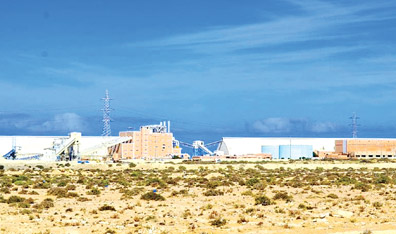Corporate scramble for Africa’s minerals:
Britain’s new
colonialism
Africa is being opened up like a tin of sardines to a new wave of resource
extraction, writes Colin Todhunter. Masked under the soubriquets of
‘investment’, ‘growth’ and ‘free trade’, a handful of vast global corporations
are systematically plundering the continent’s mineral wealth and leaving
desolation in their wake, backed to the hilt by that ever-faithful servant of
capital - the UK government.
 |
|
Port for phosphate export
from the Bou Craa mine, near Laayoune Marsa Boujdour in Western
Sahara, 11th March 2013. Photo: jbdodane via Flickr |
For too long, British companies have been at the forefront of the plunder, yet
rather than rein in these companies, successive UK governments are actively
championing them through trade, investment and tax policies.
Africa is facing a new and devastating colonial invasion driven by a
determination to plunder the continent’s natural resources - especially its
strategic energy and mineral resources. That’s the message from a damning new
report from War On Want ‘The New Colonialism: Britain’s scramble for Africa’s
energy and mineral resources’ that highlights the role of the British government
in aiding and abetting the process.
Written and researched by Mark Curtis, the report reveals the degree to which
British companies now control Africa’s key mineral resources, notably gold,
platinum, diamonds, copper, oil, gas and coal.
It documents how 101 companies listed on the London Stock Exchange (LSE) - most
of them British - have mining operations in 37 sub-Saharan African countries and
collectively control over $1 trillion worth of Africa’s most valuable resources.
The UK government has used its power and influence to ensure that British mining
companies have access to Africa’s raw materials. The report exposes the
long-term involvement of the British government (Labour and Conservative) to
influence and control British companies’ access to raw materials.
The new ‘extractive colonialism’
Access has been secured through a revolving door between the political
establishment and British mining companies, with at least five British
government officials taking up seats on the boards of mining companies operating
in Africa. Augmented by WTO rules, Britain’s leverage over Africa’s political
and economic systems has resulted in a company like Glencore being able to to
show revenues ten times that of the gross domestic product (GDP) of Zambia.
Under the guise of the UK helping Africa in its economic development (a
continuation of the colonial paternal narrative), $134 billion has flowed into
the continent each year in the form of loans, foreign investment and aid, while
British government has enabled the extraction of $192 billion from Africa mainly
in profits by foreign companies, tax dodging and the cost of adapting to climate
change.
The report highlights the roles played by major companies, such as Rio Tinto,
Glencore and Vedanta. From the displacement of people and killings to labour
rights violations, environmental degradation and tax dodging, Africa appears to
have become a free for all. In only a minority of mining operations do African
governments have a shareholding in projects. And even if they do, it tends to be
small at 5-20%.
In the report, Mark Curtis argues that an African country could benefit from
mining operations by insisting that companies employ a large percentage of their
staff from the country and buy a large proportion of the goods and services they
procure from the country. However, World Trade Organisation rules prevent
African countries from putting such policies in place.
Countries could also benefit from corporate taxation, but tax rates and payments
in Africa are minimal and companies are easily able to avoid paying taxes,
either by their use of tax havens or because they have been given large tax
incentives by governments - or often both.
And when companies export minerals, governments usually do not benefit at all.
Governments only benefit from exports when there is an export tax. There are
almost none in Africa.
The ransacking of Western Sahara One of the case studies in the report is the
scramble for gas and oil in Moroccan-occupied Western Sahara. Morocco has
occupied much of Western Sahara since 1975. Most of the population has been
expelled by force, many to camps in the Algerian desert where 165,000 refugees
still live. Morocco’s occupation is a blatant disregard for international law,
which accords the Saharawi people the right to self-determination and the way in
which their resources are to be used.
Over 100 UN resolutions call for this right to self-determination but UN efforts
to settle the conflict by means of a referendum have been thwarted by Morocco.
The International Court of Justice has stated that there are no ties of
sovereignty between Morocco and Western Sahara, and no state in the world
recognises Morocco’s self-proclaimed sovereignty over the territory.
Despite this, six British and/or LSE-listed companies have been handed permits
by the Moroccan government to actively explore for oil and gas resources, making
them complicit in the illegal and violent occupation of Western Sahara.
Cairn Energy, based in Edinburgh and LSE listed, is one such company. It is part
of a consortium, led by US company Kosmos Energy, that in December 2014 became
the first to drill for and later discover oil off the coast of Western Sahara.
The former Director of Britain’s Secret Intelligence Service, MI6, Sir Richard
Dearlove, has been a member of the Kosmos Board of Directors since 2012.
Ecologist
|

